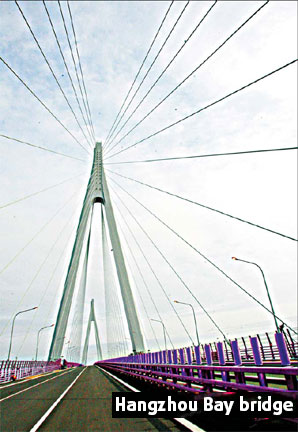

A Ningbo company driver surnamed Zhu says he's thrilled to hear that the Hangzhou Bay sea bridge will open for traffic on May 1.
Zhu, working for Shanshan Group, which moved its headquarters from Ningbo to Shanghai years ago, has been making a four-hour commute each way between the two cities on Fridays and Sundays, but the 36-km sea bridge, the world's longest, will cut the distance between the two port cities by 120 km and travel time to about two hours.
"It will take less time for my boss and colleagues traveling between the two cities, after the bridge opens," says Zhu, who is the personal driver for the company's president. It will also be more convenient for his son, studying in Shanghai Jiaotong University, to come back home every month, Zhu adds.

But for businessmen, especially those from Ningbo, the bridge, which links Ningbo's Cixi county in the south to Jiaxing in the north, doesn't just mean an easier commute.
"When the bridge opens, it will certainly bring down my fuel costs when traveling between Ningbo and Shanghai. But it's not that simple," the China Business News cites Chen Longhai, chairman of Cixi-based Haitong Food Group Co Ltd, as saying.
"The economic structure in the whole Yangtze River Delta region is going to change, which brings both opportunities and challenges for enterprises and governments in the region," he says.
He says the change means businesses will have more choices. "Where the market is more orderly and the investment environment is better, that's where we will go to do business."
Chen was one of the first private entrepreneurs who sensed the economic benefits of the bridge and one of the few private investors in its construction.
According to the China Business News, as early as in 2000 Chen decided to invest in the bridge and kept expanding his investment after it began construction in June 2003.
In 2004, a year after the bridge's construction, he bought a floor of offices on Xianxia Road in Shanghai's Changning district and moved Haitong's marketing and capital operations to Shanghai, while keeping the production base in Cixi.
He says after the bridge opens more enterprises in Cixi and wider Zhejiang province will have tighter connections to Shanghai.
Chen has already benefited from the bridge - the price of land owned by Haitong in Yuyao, Songjiang and Cixi industrial parks has kept rising since the bridge construction started and many investors have followed to work with Haitong.
Chen is now brewing a new idea, bringing the fresh vegetables that Haitong plants in Cixi to the dining tables of Shanghai.
There are more than 3,000 businesses like Haitong operating both in Cixi and Shanghai, excluding those small ones (with annual outputs lower than 5 million yuan), statistics from Cixi Chamber of Commerce in Shanghai show.
The bridge will accelerate the flow of goods and talent and push the integration of economic development in Shanghai and Zhejiang, and the Yangtze River Delta as a whole, says Lu Zheng, who directs the Institute of Industrial Economics at the Chinese Academy of Social Sciences.
While most experts believe the bridge will benefit Ningbo most, the city's economic status will be further consolidated in the Yangtze River Delta region when it becomes a hub linking cities further south in Zhejiang province with Shanghai.
A typical example is the Hangzhou Bay New District, built on the southern bank of Cixi Bay.
The 143-sq-m district recorded an annual growth rate of 50 percent during the past several years. Industrial output reached 25.1 billion yuan in 2007 and is expected to total 32.5 billion yuan this year.
Yu Liangquan, an official of the district's administrative committee, says the new district will become the center of Shanghai, Hangzhou and Ningbo after the bridge opens.
Hu Jianli, a Cixi entrepreneur who invested in the new district after learning the bridge's construction five years ago, says by doing so, he could make use of the relatively cheap land and labor in Ningbo, as well as enjoying the capital, technological and market advantages of Shanghai.
Such an advantage has inspired interest from investors from home and abroad. According to Yu, the district has introduced 247 projects, with a total investment of about 34 billion yuan, mainly focusing on auto parts manufacturing, machineries, IT industry and intelligent home appliances production.
However, for the Ningbo government, the opening of the bridge also brings it pressures - the business environment needs to be improved.
"There is no doubt about lower costs in Ningbo, but this does not necessarily mean companies would come to invest. The government needs to consider how to improve its services and offer preferential policies to facilitate investment," the China Business News cites Xu Xiang, general manager of Ningbo Airport Logistics Development Co, as saying.
Another concern is whether the bridge will spur a new round of competition between cities in the region.
Competition is unavoidable, says Chen Jianjun, director of the regional and urban economic research center of Zhejiang University, but cities in the Yangtze River Delta are more complementary than competitive.
"We don't need to worry about competition, which is a good thing and could spur the development of the whole area, just as competition among enterprises will drive the development of the whole industry," he says.
It is also unnecessary to worry about "repetitive" construction for another new bay bridge. "The Yangtze River Delta is one of China's most important industry clusters, the infrastructure construction cannot meet the demands for rapid economic growth."
Earlier this year, the National Development and Reform Commission approved the construction of another new bay bridge from Haining in Jiaxing, Zhejiang province, in the north to Shangyu, Shaoxing in the south.
CBW News
(China Daily 04/21/2008 page10)













